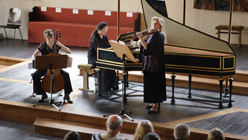“Different styles reflect different parts of my personality,” Johnson said in a phone interview from Atlanta. “When I was on tour with Amy and Vince [Gill, Amy Grant’s singer husband] for a month, I had my baroque violin with me, preparing a concert for Yale, so I do have to go between them — and it used to be harder, because of technique and style, especially the way you get tone out of the instrument with a bow; it’s so different. But I think it’s just like an actor learning different dialects or playing different kinds of people.”
Early music, which is a kind of subset of classical music, includes songs from the Middle Ages and has more leeway than traditional classical music, says Johnson. “I think early music appeals to a broader group of people than just strictly classical music like a symphony, partly because it has a lot of roots in something more approaching folk music,” Johnson relates. “I think it’s more accessible. People tend to speak to the audiences at concerts; they’re in smaller halls than a big symphony; it’s more approachable and less stuffy.”
The Music of the Spheres’ three Bay Area concerts are a good example of this. The concerts will feature the works of three historic French composers — Jean-Féry Élisabeth Jacquet de la Guerre — and because the performances are so close to Valentine’s Day, Music of the Spheres will recite quotes about love from French authors, including Victor Hugo, Colette, and Antoine de Saint-Exupéry. “It’ll be fun,” says Johnson.
All three musicians in Music of the Spheres perform with other groups and orchestras — Tanaka with the San Francisco Symphony and the San Francisco Ballet Orchestra, among others — and all three are eager to bring new audiences to classical music. If more people knew about the emphasis that early music scores place on improvisation, believes Tanaka, they could appreciate it on that level alone. Like jazz and rock, early music veers off in unexpected directions during live concerts.
“Baroque music has lots of freedom — we can improvise and we feed off of each other,” Tanaka says. “In terms of playing a melodic line, the composers leave it to us to ornament as we wish. That freedom is calculated into the music. If we don’t do that kind of ornamentation, the music isn’t as fun. And being a harpsichordist is so interesting. It’s sort of back-up harmony. The way I accompany the melody instruments — the left hand is written out for me by the composer, but the right hand isn’t. And I improvise. What we do is very much like jazz. For a jazz pianist, a lot of what’s written out is just the chord progression, and it’s up to the person to react how to play because of the way the group decides to play. It’s very un-classical in the sense that if you go to the symphony, everything is all written out, and you’re supposed to follow it to a T.”

In the last few years, a spate of pundits have declared the death of classical music. Two months ago, the New York Times featured a heated debate in its letters section about classical music’s unsteady future. A retired violinist with the Metropolitan Opera Orchestra said the solution lies with “the younger generation, which must be weaned away from the cacophony of rock and the neon glitter of American Idol-type TV shows.” Another reader — the author of a book on classical music — blamed the Baby Boom generation for eschewing classic music while embracing rock. So who’s to blame? For Music of the Spheres, the solution is to look ahead, to keep performing at a high level, and to keep advocating fun in-person music experiences.
Though the economy is still in rough shape for classical music and there are fewer opportunities to perform, Johnson is optimistic. The economy, she says, “has been a factor for all musicians I know of. I know people in some very well-known small early music groups that said they had a third fewer gigs in the last five years or so. I played at a couple of festivals I adored that either folded or just couldn’t import people and became very small and local. Some of the orchestras that used to fly people out don’t anymore. And seasons were cut back to fewer concerts. It’s affected everyone in music. But I feel like things are on the upswing now.”



